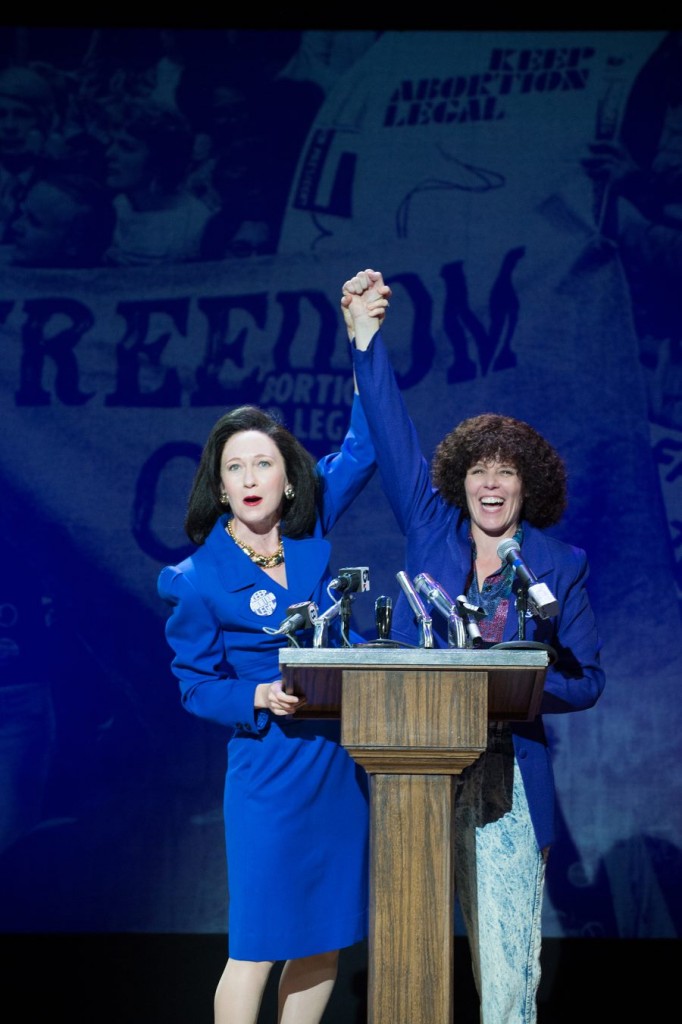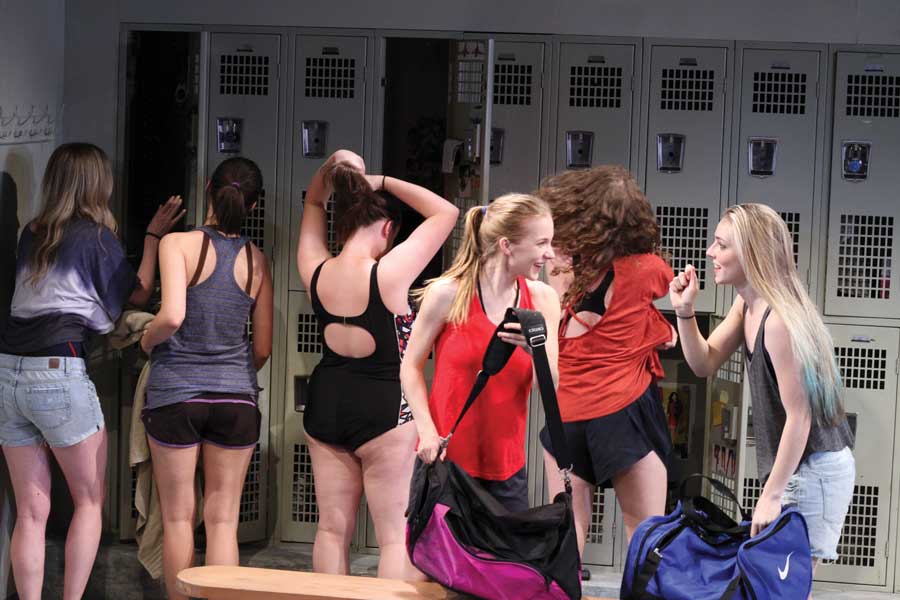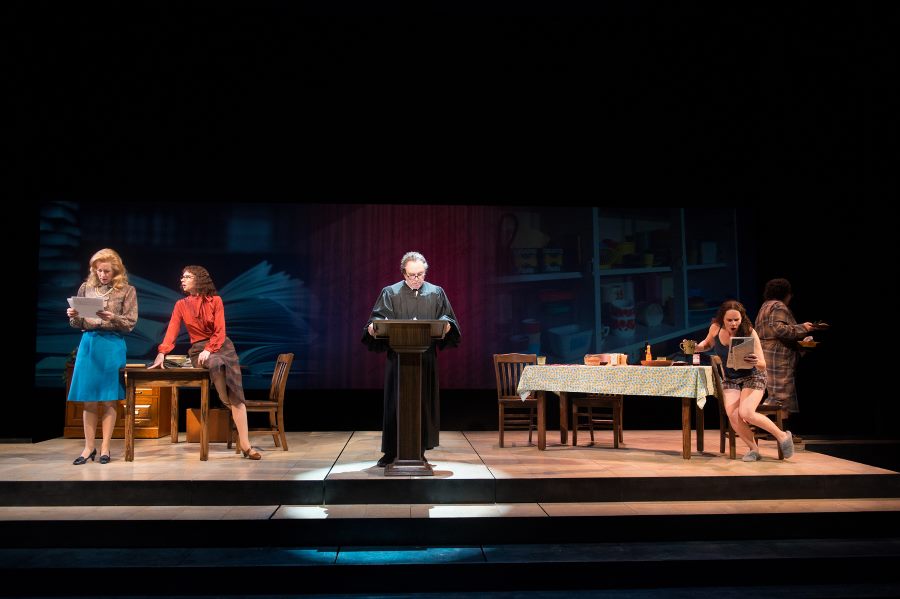When Lisa Loomer accepted the invitation to write a play for the Oregon Shakespeare Festival’s American Revolutions series about the landmark Supreme Court decision Roe v. Wade, she knew she was walking into a minefield.
“I have never ever encountered so many agendas,” Loomer said of her time working on her play Roe, which premiered April 20 at OSF and runs through Oct. 29. “I had a lot of people reading drafts, and everybody is invested in this play in a way that is far more personal than I’ve encountered with other plays. I got wildly differing reactions and very passionate agendas from my theatre folk.”
Tackling controversial topics onstage is nothing new for Loomer, who has addressed Attention-Deficit/Hyperactivity Disorder, the role of women throughout centuries of patriarchy, and the conditions of domestic workers, respectively, in her plays Distracted, The Waiting Room, and Living Out. In approaching the issue of abortion, though, and retelling the story of the struggle for the right to reproductive choice, Loomer admitted that the word “abortion” itself “is a lightning rod. It touches us—our deepest beliefs. I think it’s an impossible issue, and I think that’s why people on both sides want to simplify it.”

Roe is anything but simple. The play introduces audiences to Norma L. McCorvey, the woman who became the titular plaintiff Roe, and Sarah Weddington, the lawyer who took McCorvey’s case to the Supreme Court. Rather than dramatize only the legal aspects of the case, Loomer paints a picture of the cultural and political landscape of the time, filled with consciousness-raising groups and second-wave feminism. But she also addresses McCorvey’s recanting of the decision, her conversion to the Catholic faith, and her time as a lesbian.
“As I did more reading and got into Norma’s story, I thought, This story allows me to look at the divide in American culture over the issue, and that’s what really interested me,” Loomer said. “What is it about this issue that has caused the whole country to be so divided? What is it that causes politicians to use this for their own political ends? What is everyone’s stake in this issue that is so deep? I wanted to look at why we can’t talk to each other about this issue.”
But despite the subject’s timelessness, few plays about abortion have been presented in mainstream theatre, and many that include the procedure in their plots do not mention it by name, choosing to refer to it only in the vaguest terms. I Am a Camera, a 1951 play by John Van Druten, which inspired the musical Cabaret, does not use the word in its text. David Rabe’s In the Boom Boom Room, a chronicle of a naïve aspiring dancer Chrissy and her difficult relationship with her parents, was first performed in the 1970s, and it does mention the procedure by name.
In contrast, Sidney Kingsley’s Men in White, first performed in 1933, details the death of an unmarried women due to complications from a septic abortion, as did Keely and Du, first produced 60 years later. The play, written under the pen name Jane Martin, depicts the abduction—or, as the abductors would call it, rescue—of Keely, a young woman attempting to abort a baby conceived by the rape of her ex-husband.
Frank Wedekind’s Spring Awakening, which was first published in 1891, uses the words “rape” and “abortion” bluntly in some translations, but Bridgette Wimberly’s Saint Lucy’s Eyes, which was first performed in 2001 and chronicles the work of a woman who provided abortions before they were legalized, the word is only spoken by a man accusing his wife of performing the procedure. And in Tom Kitt and Brian Yorkey’s If/Then, which bowed on Broadway in 2014, the word “abortion” is never said, despite there being a crucial plot point involving a character’s decision to have one.
The subject remains a dividing line, both onstage and off. But Roe is not the only new play that seems to be addressing it head-on. Ruby Rae Spiegel’s Dry Land bowed in a Colt Coeur production at HERE Arts Center in New York City in 2014, around the same time that political attacks on Planned Parenthood, motivated by selectively edited activist videos, began increasing in number. The play centers on a teenager faced with an unexpected pregnancy who asks a friend to help her with a do-it-yourself abortion. In submitting the script of Dry Land to theatres for consideration, Spiegel was frequently asked to remove the scene in which the abortion is performed. But she said removing that scene would negate what she was doing with the play.
“The whole point is to destigmatize this private, silent experience that’s kind of common,” she said. “It was crazy, because it’s one of the more common experiences that exist. It’s not that shocking to women who have periods every month to be a woman bleeding from her vagina.”

Colt Coeur artistic director Adrienne Campbell-Holt, who directed Dry Land, also strove to address the play’s subject by unapologetically saying the word in press materials that emphasize Dry Land’s direct approach of the subject. Her efforts reflected one of Spiegel’s intentions when writing the play: to resist the polarizing conversations about the subject.
“It’s completely fine to feel strange and mixed and uncomfortable about the experience,” Spiegel said. “I have a lot of respect for people who do believe that life starts at conception, but I don’t think they should legislate my body or anyone else’s body. It’s a complicated issue.”
In contrast to the small number of plays that portray abortion onstage, both Spiegel and Campbell-Holt commented on the many plays that portray violence against women. When working as an actress, Campbell-Holt recalled that she was asked to portray “all kinds of abuse and rape onstage.”
“You can turn on the TV and so much violence against women is acceptable, but not a private violence,” Spiegel added. “That also is complicated because there’s a kind of freedom and agency around it. There’s definitely a kind of male violence that is more acceptable.”
Many audience members told Campbell-Holt that they found the anticipation of the character’s abortion the most difficult moment to watch, out of concern for the character’s livelihood and the awareness that she had no support system. (Dry Land is set in Florida, a state where women under the age of 18 are required to obtain parental consent 48 hours before an abortion.) Additionally, many people volunteered stories about their own experiences.
“While it may be uncomfortable, it’s really important for men and women to come forward about their own experiences so it’s not the most interesting thing about anyone,” Campbell-Holt said. “We would never talk that way about a miscarriage. People miscarry all the time, and they’re similar physical experiences. But we sort of respect that as a private, hard thing people go through. It feels we should have the same respect for the woman’s right to choose. I’m sure it will make people uncomfortable, but I think you have to make people uncomfortable until it becomes part of the dialogue.”
The subject of abortion continues to inspire passionate reactions from audience members. Before Roe went into production at OSF, Loomer received a note from a longtime patron informing the theatre that her theatre membership was being withdrawn for the year because the play sounded like “a pro-choice polemic.”
The speed in which people and plays are labeled as “pro-choice” or “pro-life” is something Winter Miller hopes will lessen as more works of drama present varying points of view. The playwright, whose Spare Rib is described as “an unruly history of abortion,” said she hoped to address the semantics surrounding the subject with the piece, which features talking fetuses, a lesbian couple discussing pregnancy, and conversations among the Jane Collective, an underground abortion service.
“The way that we talk about abortion is really fucked up,” Miller said. “We’ve lost all these rights over our bodies, and I wanted to wake up people who have been slumbering who don’t know that this hasn’t always been a right, and that the right has slipped away.”
Spiegel was also aware of people’s eagerness to label Dry Land as “an abortion play.” Instead, she said, she wanted the play to portray the experience of an abortion for the one character.
“It’s such a different experience for so many different people with such a wide range of emotions or ways that people think about it,” she said. “For some people, it’s nothing. For other people, it’s a really intense experience. Not having many plays on the subject in the landscape, I was scared—especially because it’s such an unsafe abortion in the play—that [it] would somehow say something about abortion.”
The reception of Dry Land, however, has inspired some optimism in Spiegel, who shared that, though no established theatres wanted to produce the play before its 2014 production, it is now being performed around the country. “That, I hope, is a kind of message,” she said.
Loomer also hopes the dialogue about reproductive rights will continue to develop. “There is something so essential at stake here, and that’s choice,” she explained. “We tend to raise placards and shout slogans, and we don’t talk to each other. For me, the first step is always compassion and listening. And I know that’s not necessarily a popular point of view, but it’s pretty much what I’ve come to and where I feel that I can contribute.”


